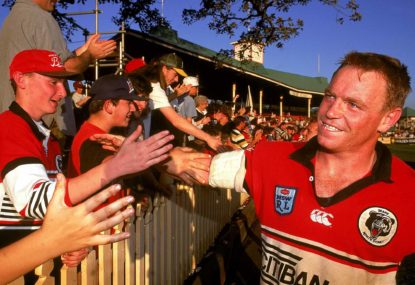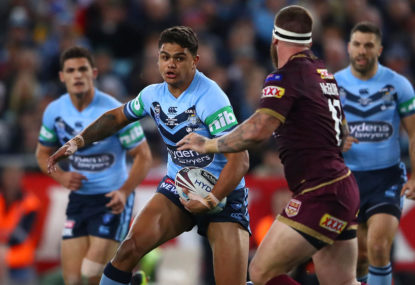The salary cap provides an even playing field for clubs, regardless if they are flushed with cash or scraping the bottom of the barrel.
Over the past three seasons a staggering 15 teams have finished in the top eight in the NRL, leaving 2009 grand finalists Parramatta as the sole club not to be given a crack at finals glory.
I doubt that there is a fairer platform available for the fans, clubs, and administrators.
Recently though, an alarming increase springs to mind of certain players who appear to have taken large chunks of cash from clubs after a stellar season, to then grossly under-perform once a long term deal has been secured.
I personally prefer to avoid the dropping of individual’s names – though I’m sure that most readers will have a few that instantly spring to mind. Most of them are simply referred to as “the bloke we spent a fortune on, who did bugger all”.
So how do you measure a player’s worth and reward them justly for their efforts?
In business it is far more cut and dried. You perform and you are rewarded. If you feel that you’re being taken for a ride, then you can usually look for alternate employment with higher compensation.
Those who under-perform in business generally face the risk of termination without the security of a specific contracted figure like most NRL players have.
How could your club fairly pay their players, stay within the salary cap, and expect the best from each player week in and week out?
A weekly system of match payments based on an individual’s performance may solve a range of issues, while targeting players who fail to give one hundred percent regularly.
It has worked with sales professionals since day dot – so why not adopt a similar reward system for rugby league professionals?
Put simply, the better you perform – the higher your earnings.
A figure approaching six million has been bandied about the place as the likely figure for the salary cap. Most clubs have a roster of about 30 players.
If you were to give each player a base salary of $60k this would then leave $4.2 million to disperse for the remainder of the year as match payments.
The competition could be split into 30 rounds as there is a possibility that you will make the finals and also play in the grand final. Therefore there would be $140,000 available for each and every round.
As a bonus, each rugby league club would get to keep the $140k for any or all of the four rounds that their team failed to qualify for the finals.
Players who fail to make the starting team would have no chance of further reward that week. All players and the coaching staff would vote and rank each player based on both their effort and individual performance.
Figures would be tallied with the weekly amount of $140,000 being split up in the following manner;
1st $25,000, second $20,000, third $15,000, fourth $12,000, fifth $10,000, sixth $7,500, seventh $7,000, eighth $6,500, ninth $6,000, tenth $5,500, eleventh $5000, twelfth $4,500, thirteenth $4,000, and fourteenth to seventeenth will receive $3000.
A player of the ilk of Cameron Smith or Johnathan Thurston would expect to finish in the top five regularly, and therefore justify a yearly bonus salary of around $450k. Combine this with their initial $60k wage and they’re having a pretty good year.
The absolute maximum a player could earn in a year would be an impressive $810k.
Players who have an ordinary year would still expect to make a minimum of $138k all up, provided that they remain in the starting 17 throughout the year.
Injured players would need to be given special consideration in the form of assistance from their fellow players contributing 2% of their match day salary. This would mean that a player who had a season ending injury in round one would still receive a minimum of $132k.
The NRL must fully reward all clubs who make the finals. The current $100k for the grand final winner is an absolute joke – this should be the amount awarded solely to the winner of the Clive Churchill medal.
The Grand finalists in reality should receive a minimum of a million dollars, with the runners up earning at least half a million.
Third to eighth place should also receive a handsome bonus, scaled to their final finishing position. Clubs could then split these windfalls between their players, coaching staff, and administrators as just reward for a successful season.
The holiday would end for the bloke who’s pocketed that great big chunk of change and given little in return. While fixed contracts are in place he has prevented a team mate from justifiably earning some of that coin.
A reward system based on merit would put all players on notice to perform. Players who are suspended for reckless on-field actions would automatically loose the opportunity to further their salary, as would those who are sat down for poor off-field behaviour.
The quality of NRL games, and both player and club culture, could only improve.



































































































